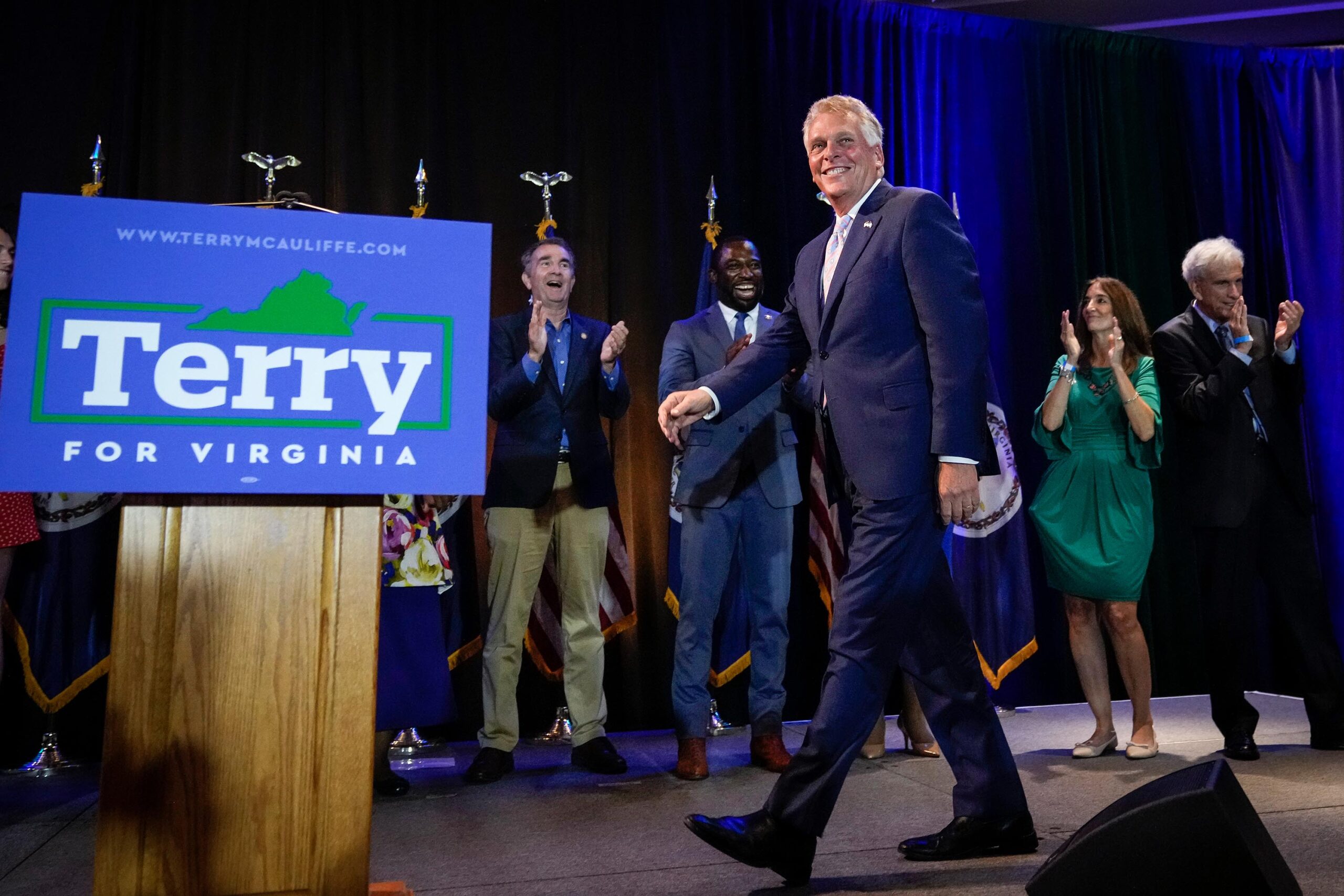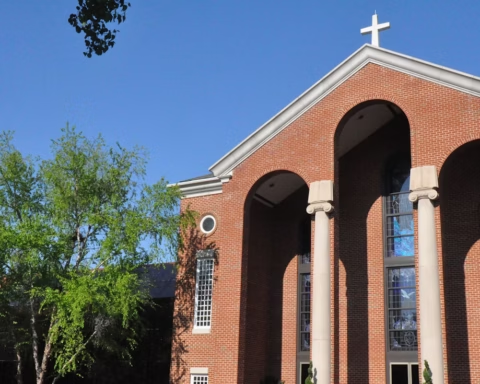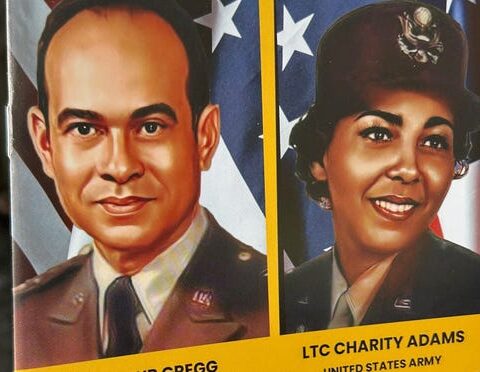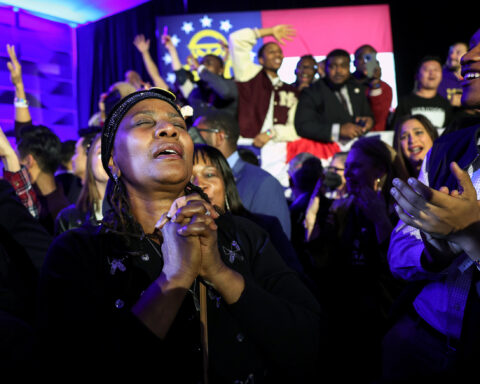Back in 2013, Terry McAuliffe won a majority of Black voters when he sought — and ultimately won — the top office in Virginia.
As he vies for a second term as the Commonwealth’s governor, he wants to do it again.
With less than a month to go in the election, McAuliffe and Republican nominee Glenn Youngkin are locked in a competitive race in a state Joe Biden carried by 10 points last year. The outcome of this year’s contest will be closely watched inside and outside the Commonwealth for clues about the mood of the electorate heading into the 2022 midterm elections.
According to a recent Monmouth University poll, McAuliffe has an advantage among voters of color — 83% of Black voters support him, compared to the 3% who are backing Youngkin. And a Fox News poll shows McAuliffe is the preferred candidate among Black voters by 69 points. (Black Virginians make up roughly 20 percent of the state’s population.)
It’s an advantage he’s seen before. In 2013, the Virginia Democrat won 90% of their votes, compared to the 8% won by Republican Ken Cuccinelli.
His campaign’s outreach efforts this year include targeted communications to Black voters, visiting Black churches across the state, organizing Sunday “Souls to the Polls” events and working with field organizers at Virginia’s major colleges including Historically Black Colleges and Universities like Hampton University and Norfolk State University among a host of other initiatives.
When asked by CNN about his commitment to addressing the concerns of Black voters following the second and final debate against Youngkin last month, McAuliffe said, “I have tremendous support from the Black community.”
He cited his 2015 executive order “banning the box,” which largely prohibited asking about criminal history on state employment applications. He also mentioned his move to ban the Confederate flag from state license plates and his push to lay the groundwork for Medicaid expansion.
Additionally, his campaign, seemingly attune to criticism that Black voters are taken for granted by Democrats, has published a comprehensive plan to “Lift Up Black Virginians.” It includes viewing racism as a public health crisis, making the restoration of voting rights permanent in Virginia’s constitution and transforming Virginia’s regulatory process to increase support for minority-owned businesses among other provisions.
McAuliffe himself often points to a voting provision he dismantled the last time he was the chief executive of the Old Dominion, ultimately restoring voting rights for more than 173,000 formerly incarcerated Virginians.
That act granted Richmond activist Christopher Rashad Green the right to vote for the first time in 30 years in 2016.
“When I voted in 2016, it was just so empowering,” Green said. “… My vote is political currency. And that’s my currency. I could spend it however I want to.”
He used that currency this year to vote early for McAuliffe.
Louise Lucas, the Virginia Senate’s president pro tempore, was among McAuliffe’s early supporters. She serves as co-campaign chair and asked him to run for governor again.
“Terry has been absolutely wonderful for the Commonwealth for all people. I’m telling you, he has made a gallant effort to make sure that we get out the vote in the Black community…I mean, I don’t know what more anybody can expect this man to do,” said Lucas. “He has worked his heart out.”
Still, Youngkin is not without his supporters.
On Saturday, the Republican nominee received the endorsement of the business-focused Hampton Roads Black Caucus, a group that works to increase the representation of elected officials who advocate for legislation aimed at enhancing the Black community.
“The Black Virginians for Glenn Coalition was one of the first coalitions the campaign launched. It plays a critical role in reaching out to Black voters and demonstrating that Glenn’s plans to remove regulations so businesses can thrive, provide parents with school choice, and boosting our economy — will best serve them,” Youngkin campaign spokesperson Macaulay Porter said.
Once competitors, now surrogates
While the Virginia Legislative Black Caucus did not endorse any candidate ahead of the Democratic primary earlier this year, all 23 members of the Black Caucus now support McAuliffe, according to the group’s executive director, Adele McClure.
But it wasn’t always that way. In the primary, he ran against one current and one former member of the caucus: Virginia state Senator Jennifer McClellan and former Virginia state delegate Jennifer Carroll Foy.
McClellan had previously suggested McAuliffe could not excite and expand the base. But in an interview with CNN, she noted that “voters chose him.” She now chairs Women for Terry.
“I am supporting him, because I think he is more in line with taking Virginia in the direction that we need to go,” said McClellan.
“He really pushed to improve and expand and grow Virginia’s economy, diversify our economy. That included focusing on small women and minority, Black-owned businesses. He really pushed to have a diverse cabinet…historic investments in our public education system,” McClellan said of his first-term track record.
Earlier this year, Carroll Foy described McAuliffe as “failing the people of Virginia.” She is now actively campaigning for McAuliffe, because “now he’s the Democratic nominee.”
She views McAuliffe as Democrats’ best hope for expanding on the progress the party has made in the state legislature in recent years.
“I want to see legislation that I started like ending pregnancy discrimination, passing the Equal Rights Amendment, I want those things that I’ve started to continue to move forward,” she said.
Still, the Petersburg native detailed this election’s unprecedented challenges.
“When I am knocking doors…what I’m hearing is a lot of apathy. And people are telling me how they’re still looking for work and a job, how they’re sitting at their dining room table with an open chair, because they’ve lost a loved one recently due to Covid. And it’s hard to focus on an election when you’re about to get evicted,” she said.
Grassroots Black activists turn up the heat
Richmond-based organizer Chelsea Higgs Wise is not impressed with the McAuliffe campaign’s Black outreach, dismissing the effort as talking points that won’t amount to substantive policy changes unless grassroots activists like her keep the pressure on McAuliffe, should he be elected.
“I do not think that the Terry McAuliffe campaign is doing the type of outreach that will make a real difference and reaching Black voters, particularly after 2020 with Covid and the uprisings,” said Higgs Wise, in reference to the historic call for police reform following the murder of George Floyd in Minneapolis.
Higgs Wise, the executive director of Marijuana Justice, voiced several issues with the campaign, including “running on things that Black women started,” and is especially frustrated with McAuliffe’s reversal on ending qualified immunity, a legal principle that shields police officers from civil lawsuits.
McAuliffe said he supported ending qualified immunity during the Democratic primary, but reversed his position after becoming the nominee.
“Terry McAuliffe is very loud about funding police. That means moving money from where we need for social services, mental health, food, transportation, and he will move that more to law enforcement,” she said.
The Virginia State Conference NAACP, a nonpartisan organization, has not endorsed any candidate in the gubernatorial race, but the group’s president, Robert N. Barnette Jr., described McAuliffe’s wavering on ending qualified immunity as “concerning.” The organization’s top priority is police reform and they’ve been active in voter education, informing Virginians of who the candidates running for elected office in Virginia are and their platforms.
“I think Terry knows that qualified immunity, really is hampering transparency in our Black and brown communities,” Barnette Jr. said.
“It doesn’t matter who’s governor, we’re going to still ask the governor to ask the attorney general to investigate law-enforcement involved shootings,” he added.
Princess Blanding, who is mounting a third-party run in the Virginia race for governor, is harshly critical of McAuliffe and Black Democratic leaders across the state. She suggests Black Virginians with dissenting views like hers are afraid to come forward. Her brother, Marcus-David Peters, was shot and killed by police when he was experiencing a mental health episode in 2018.
“They just expect that they will automatically get the Black vote. They have to earn it. And they have not earned it,” Blanding said of the McAuliffe campaign.
When CNN noted there was significant overlap between the policy positions championed by Blanding and McAuliffe, Blanding said, “Anybody can put anything up on their website…but are you going to follow through?”
Alexsis Rodgers, a former Richmond mayoral candidate who now works as the Virginia state director for the domestic workers advocacy group Care in Action, sees the McAuliffe campaign responding to the pressure from organizers in real time.
“I’ve been glad to see McAuliffe cite repeatedly that he is going to fight for paid sick leave, paid family and medical leave, and even make sure that home care workers get a raise. And I think that is a direct result of workers organizing…who have really pushed him to adopt policies that are going to uplift Black women and working women of color,” Rodgers said.
Rodgers says Black voters across the state, whose voting power may determine the outcome of the election, are seeking to elevate elected officials with a strong plan to respond to the pandemic. Rodgers notes the governor has limited authority and stresses there should also be concern for the down ballot races that will determine who controls the state’s General Assembly to “make sure that down ballot we have strong women of color and Black women who are going to be able to hold the administration accountable to the commitment that they’ve made along the campaign trail.”
‘Absolutely critical’
On Sunday evening in Manassas, a Northern Virginia city about 30 miles outside of Washington, DC, dozens of Black women gathered to show their support for McAuliffe at an event held in the backyard of the home of former Manassas Democratic Committee Chair EJ Scott. When McAuliffe walked in, he asked 98-year-old Jane Paschall if she was single, generating thunderous laughter from the crowd before going on to suggest he pair her with his young staffer.
When he made his pitch for another term at what he describes as the “greatest job in America,” McAuliffe promised high-paying jobs, an open and welcoming state for women and the LGBTQ community and protecting reproductive choice.
Marveled by how the state’s political landscape has shifted in the past few decades with Democrats holding a majority in both chambers in the state legislature and an expansion of early voting, the women say they are in part attracted to McAuliffe based on how he talks about racial injustice.
“Now, if you were a young White kid who killed somebody, you might get 25 or 30 years,” McAuliffe said to the group, lamenting cases of Black men who received life sentences for lesser crimes like robbery and touting his own record of providing them pardons, later describing himself to CNN as a “criminal justice warrior.”
Franklin County School Board member Penny Blue said she first became attracted to McAuliffe’s message when she heard him talk about the school-to-prison pipeline, the tendency of marginalized minors who are harshly punished in school ending up in the juvenile justice system.
“I was impressed that he had the nerve to say that because most people don’t say it and don’t talk about it,” said Blue, who traveled to the event from four hours away in Southwest Virginia.
When CNN asked McAuliffe if he viewed Black Virginians as consequential to his victory in November, McAuliffe said, “I view Black participation, key for any race, not just governor. But any race we run here in Virginia and around the country, just absolutely critical.”





